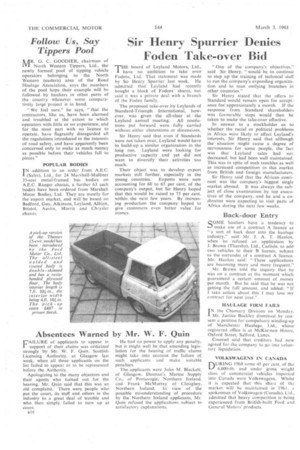Sir Henry Spurrier Denies Foden Take-over Bid
Page 44

If you've noticed an error in this article please click here to report it so we can fix it.
THE board of Leyland Motors, Ltd., have no ambition to take over Fodens, Ltd. That statement was made by Sir Henry Spurrier last week. He admitted that Leyland had recently bought a block of Fodens' shares, but said it was a private deal with a branch of the Foden family.
The proposed take-over by Leylands of Standard-Triumph International, however, was given the all-clear at the Leyland annual meeting. All resolutions put forward were fully carried without either abstentions or dissensions.
Sir Henry said that even if Standards were not taken over, Leyland would have to build-up a similar organization in the long run. Leyland were looking for productive capacity and yet did not want to diversify their activities too much.
Their object was to develop export markets still further, especially in the young countries. Exports were now accounting for 60 to 65 per cent. of the company's output, but Sir Henry hoped that this would be raised to 75 per cent. within the next few years. By increasing production the company hoped to give customers even better value for money. " One of the company's objectives," said Sir Henry, "would be to continue to step up the training of technical stall to run the company's expanding organization and to man outlying branches in other countries."
Sir Henry stated that the offers to Standard would remain open for acceptance for approximately a month. If the response from Standard shareholders was favourable steps would then be taken to make the take-over effective.
In answer to a stockholder as to whether the racial or political problems in Africa were likely to affect Leyland's interests, Sir Henry said that although the situation might cause a degree of nervousness for some people, the fact was that Leyland sales bad not decreased, but had been well maintained. This was in spite of such troubles as well as increased competition in this market from British and foreign manufacturers.
Sir Henry said that the African continent was the company's biggest single market abroad. It was always the subject of close examination by top executives of the company, and he and a codirector were expecting to visit parts of Africa during the next few weeks.
Back-door Entry
SOME hauliers have a tendency to make use of a contract A licence as "a sort of back door into the haulage industry." said Mr. J. A. T. Hanlon. when he refused an application by I. Brown (Thursby), Ltd., Carlisle, to add two vehicles to their B licence, subject to the surrender of a contract A licence. Mr. Hanlon said: "These applications are becoming more and more frequent."
Mr. Brown told the inquiry that he was on a contract at the moment which guaranteed a certain amount of money per month. But he said that he was not getting the full amount, and added: "If
take action about this I may lose my contract for next year."
HAULAGE FIRM FAILS I N the Chancery Division on Monday,Mr. Justice Buckley dismissed by consent a petition for compulsory winding-up of Manchester Haulage, Ltd., whose registered office is at McKiernan House, Oxford Street, Salford, Lancs.
Counsel said that creditors had now agreed for the company to go into voluntary liquidation.
VOLKSWAGENS IN CANADA nURING 1960 some 45 per cent. of the 6,000-1b. and under gross weight class of commercial vehicles imported into Canada were Volkswagens. Whilst it is expected that this share of the market will be maintained in 1961, a spokesman of Volkswagen (Canada), Ltd„ admitted that heavy competition is being experienced from British-built Ford and General Motors' products.




































































































































